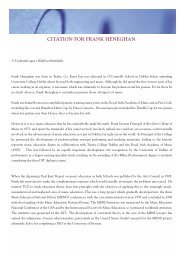TWICE THE SIZE - DIT Update - Dublin Institute of Technology
TWICE THE SIZE - DIT Update - Dublin Institute of Technology
TWICE THE SIZE - DIT Update - Dublin Institute of Technology
You also want an ePaper? Increase the reach of your titles
YUMPU automatically turns print PDFs into web optimized ePapers that Google loves.
4. Public Private Partnerships [PPP]<br />
Public Private Partnership (PPP) is an umbrella name for a range <strong>of</strong> initiatives, which involves<br />
the private sector in the operation <strong>of</strong> public services. According to the United Nations<br />
<strong>Institute</strong> for Training and Research, a fully functioning infrastructure and efficient provision <strong>of</strong><br />
social services are the foundation <strong>of</strong> sustained urban development, and public private<br />
partnership have been an effective tool for achieving improved performance in this area<br />
(UNITAR, 2002).<br />
The British Government launched their PPP development policy in 1992, under the label<br />
‘Private Finance Initiative’ (PFI). The Private Finance Initiative is a procurement mechanisms<br />
by which the public sector contracts to purchase quality services on a long-term basis, so as to<br />
take advantage <strong>of</strong> private sector management skills incentivised by having private finance at<br />
risk. This includes concessions and franchises, where a private sector partner takes on the<br />
responsibility for providing a public service, including maintaining, enhancing or constructing<br />
necessary infrastructure. Many public sector bodies throughout Europe are now looking to the<br />
UK-PFI model as a potential way <strong>of</strong> procuring much needed municipal services and securing<br />
the effective delivery <strong>of</strong> urban renewal.<br />
PriceWaterhouseCoopers maintain, in their report Developing PPP’s in the New EU (2004), that for most<br />
European Countries in the future, the reality is that some form <strong>of</strong> PPP/PFI is likely to emerge as the<br />
principle means <strong>of</strong> providing public services in the absence <strong>of</strong> adequate public sector funding.<br />
5. Land Pooling<br />
The process known as land pooling, land readjustment or land consolidation is used to effect<br />
land assembly in many parts <strong>of</strong> the world where simple public sector compulsory purchase<br />
powers are unacceptable alone. There are a variety <strong>of</strong> models <strong>of</strong> land pooling (Connellan,<br />
2002):<br />
Entirely voluntary, achieving land assembly by agreement amongst owners.<br />
Public authority inspired, controlled and compulsorily affected: (German<br />
model).<br />
Voluntary but having recourse to an authorised framework: (French model).<br />
Authorised framework designed on majority rules, where you can override<br />
dissenters and enforce participation: (Japanese model).<br />
Land pooling does not have to involve land acquisition, nor does it require huge funds for<br />
compensation, and is argued to be a more effective way <strong>of</strong> delivering land assembly needs in<br />
urban regeneration or large scale development. It is a process whereby landowners combine<br />
their interests in order to participate in land assembly, servicing and disposal in accordance<br />
with a plan.<br />
The origin <strong>of</strong> land pooling is considered to be from Germany, where it was first practiced in the late<br />
19 th century. The country has a well-established method for implementing land-pooling projects and it<br />
developed 5000 hectares <strong>of</strong> land through these techniques in the late 1980s. The German model<br />
operates through the formal procedure <strong>of</strong> land readjustment known as ‘Umlegung’.<br />
References:<br />
Connellan, O. (2002) Land Assembly for Development – The Role <strong>of</strong> Landpooling, Land<br />
Readjustment and Land Consolidation. Discussion document from FIG Conference 2002.<br />
Washington. Urban Villages Forum.<br />
McGreal, S., Berry, J., Lloyd, G. & McCarty, J. (2002) ‘Tax-Based Mechanisms in Urban<br />
Regeneration: <strong>Dublin</strong> and Chicago Models’, Urban Studies, 39 (10), 1819-1831.<br />
Ratcliffe, J., Branagh, S. & Williams, B. (1999) Fiscal Incentives and Urban Regeneration.<br />
Bolton Street, <strong>Dublin</strong> <strong>Institute</strong> <strong>of</strong> <strong>Technology</strong>, <strong>Dublin</strong>.<br />
United Nations <strong>Institute</strong> for Training and Research. (2002) PPP for Sustainable Development.<br />
Available: http://www.unint.unitar/ppp<br />
Urban Land <strong>Institute</strong> (2004). Tax Increment Financing in Chicago. Available:<br />
http://www.uli.org<br />
61








